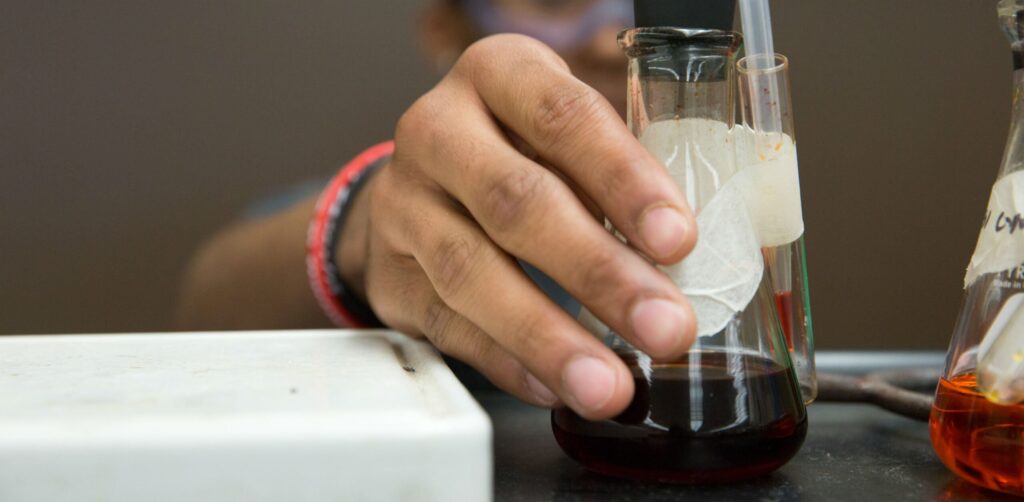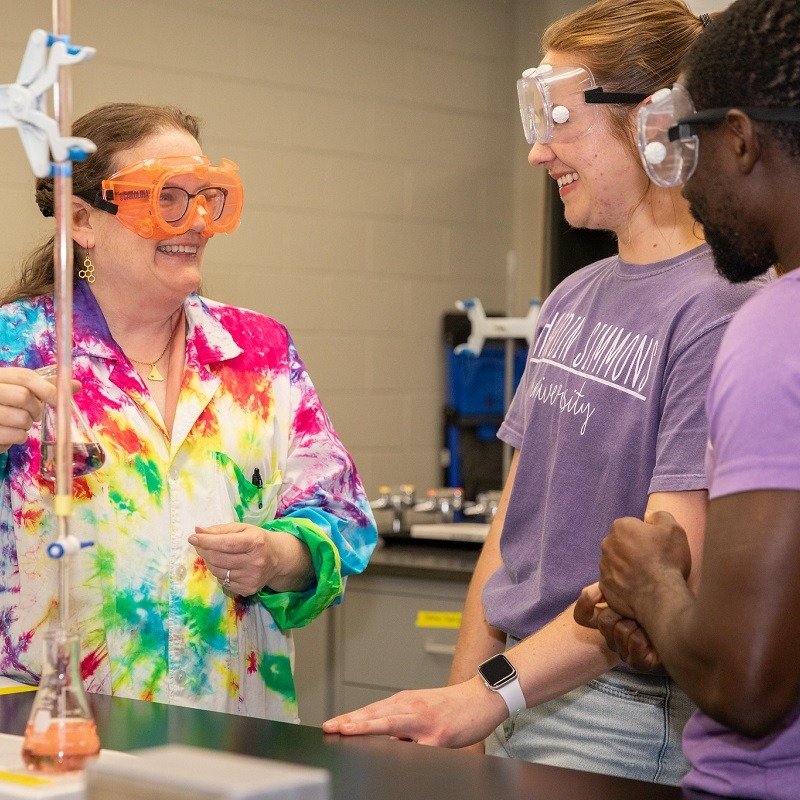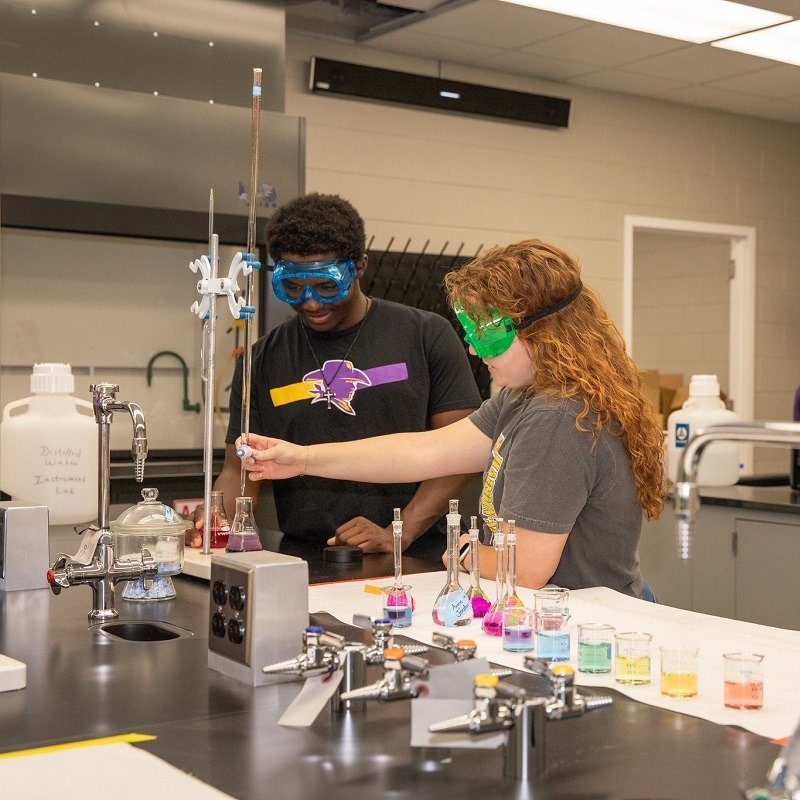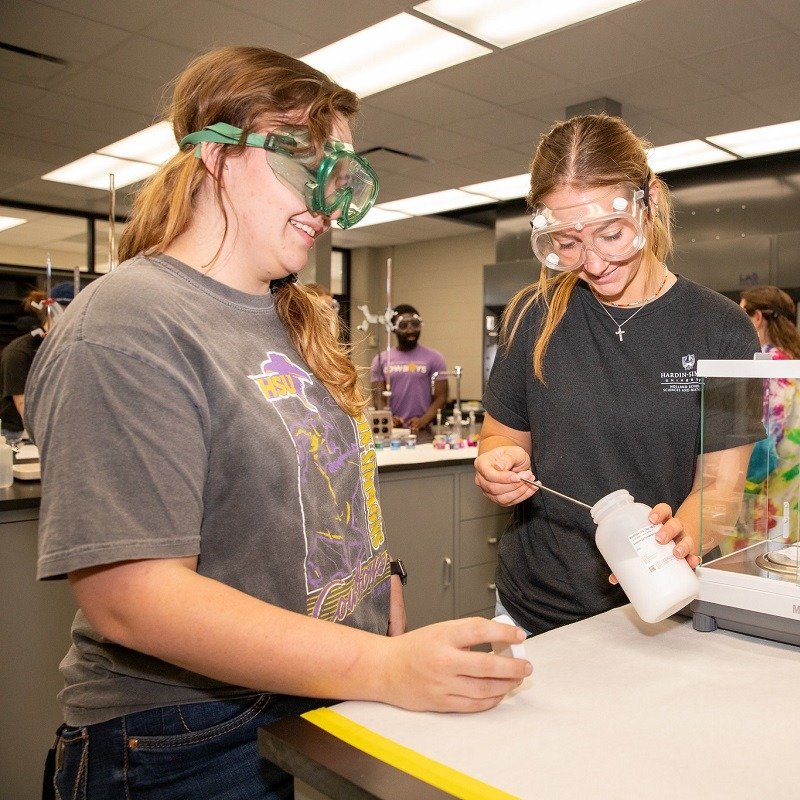Intro Block Section Instruction
Form Block Section
Write all of the introduction content below. Only use NON
FULL-WIDTH blocks.
Full-Width blocks can be inserted
outside of this block and will wrap around the form.
Use the custom HTML block below to embed your form.
Create large-scale impact from a molecular level at HSU in Abilene, Texas.
What do you get with the combination of biochemistry and molecular biology? Access to groundbreaking research that impacts public health. If you’re driven to understand the miracle of life beginning at the smallest point, a degree in biochemistry and molecular biology will give you the tools and tactics for uncovering cures, understanding biological processes, discovering the why behind disease, and so much more.
Are you fascinated by the miracle of life? Earn your Bachelor of Science in Biochemistry and Molecular Biology at Hardin-Simmons University and use cutting-edge technology to explore how life works at the molecular level.
With a degree in biochemistry and molecular biology, you’ll develop a much wider breadth of expertise than simply a biochemistry major or a molecular biology major. You’ll take an even mix of courses in biology and chemistry, ensuring that you’re prepared for careers and academic programs that require knowledge and skills in either or both fields. At HSU, you’ll also benefit from a supportive community of expert faculty and advisors—from orientation to well beyond graduation day.
What Is Biochemistry and Molecular Biology?
Biochemistry and molecular biology are sub-disciplines within the more general area of biological sciences. Biochemistry concentrates on the structure and function of compounds such as DNA, enzymes, and proteins. Molecular biology focuses on how molecules convert information into chemical reactions.
Combined, these sub-disciplines form the intersection of the classical disciplines of chemistry and biology while taking advantage of the lab techniques of each. By majoring in both biochemistry and molecular biology—rather than one or the other—you get to be on the frontlines of groundbreaking research in both biotechnology and medicine, opening the door to more career pathways for biochemistry and biology.
What You’ll Learn
Earning a biochemistry and molecular biology degree from HSU means you’ll enjoy more than just an exceptional educational experience. You’ll also enjoy being a member of a thriving community of likeminded peers and professionals. We offer several societies and clubs to help you build networks and make long-lasting relationships. These include:
- The Holland School of Sciences and Mathematics Research Society
- Pre-Health Club
- Hardin-Simmons University’s Chapter of Tri-Beta (Biology Honor Society)
Scholarships and Awards
Hardin-Simmons University prides itself on offering an affordable and highly accessible degree in biochemistry and molecular biology. We’ve been blessed with caring donors who have helped us establish several scholarships exclusively for biochemistry and molecular biology majors. You may also be eligible for general scholarships and grants at HSU.
Why Earn Your Degree in Biochemistry and Molecular Biology at Hardin-Simmons?
Why Earn Your Degree in Biochemistry and Molecular Biology at Hardin-Simmons?
Join a Supportive Community
Our labs and classes maintain a student-faculty ratio of 8:1, which means you’ll receive the personal attention and support of our highly experienced and knowledgeable faculty. You’ll also have more opportunities to meet and collaborate with other biochemistry and molecular biology majors.
Combine Your Biochemistry and Molecular Biology Degree With a Pharm.D.
Our affiliation with Texas Tech University Health Sciences Center School of Pharmacy enables you to earn a Doctor of Pharmacy (or Pharm.D.) while pursuing your degree in biochemistry and molecular biology at HSU. You’ll save valuable time earning your Pharm.D. and have exclusive access to cutting-edge resources and nationally recognized faculty.
Texas Tech University Health Sciences Center School of PharmacyProfessional Preparation
On average, 80% of HSU biochemistry and molecular biology majors are accepted to a graduate program within one year of graduation, thanks in part to the unique multidisciplinary nature of our program. Graduates not pursuing advanced degrees have successfully found rewarding careers in biotechnology and other related industries.
Outcomes
According to the Bureau of Labor Statistics (BLS), employment in healthcare careers is expected to grow faster than any other occupational field within the next decade, adding more than two and half million new jobs. Earning a bachelor’s degree in biochemistry and molecular biology from HSU will prepare you to excel in this fast-growing market and take on a wide range of advanced degrees and careers in biotechnology, molecular biology, pharmacy, education, and medicine.
You’ll have a much wider variety of career options than as a biochemistry major or biology major. Past graduates have gone on to work at prestigious organizations such as the Hendrick Medical Center, Indexx Laboratories, and even here at Hardin-Simmons University.
Pharmacy is another exciting field with broad career opportunities in research, education, veterinary pharmacy, and community pharmacy. At HSU, you can concentrate in pre-pharmacy to prepare for the Pharmacy College Admissions Test (PCAT) and apply to pharmacy school.
Salary for Biochemistry and Molecular Biology Degree Graduates
According to Payscale.com, professionals with a Bachelor of Science in Biochemistry and Molecular Biology earn an average salary of $77,000 a year. In comparison, the average salary for a biochemistry major is $74,000.
“The faculty in the BIMB department have always been nothing short of amazing! They created an environment for me to really flourish and develop as a scientist. Without them, I would never have pursued a PH.D. program and I am forever grateful for everything they did.”
Tristen Tellman, Biochemistry and Molecular Biology (B.S.), 2016

Degree Tracks
Click on plus button at the bottom of this Accordion BLOCK (not accordion tab) to create a new tab. Select Accordion TAB block to edit tab headline. Select nested blocks within accordion tab to edit content.
-
Pre-Medical Track
The Pre-Medical track at HSU will prepare you to matriculate into medical school to earn a Doctor of Medicine (MD) or Doctorate of Osteopathic Medicine (DO) degree. As a physician, you may:
- Diagnose and treat illness, disease, and/or injury
- Prescribe medication
- Create treatment plans
- Perform routine physicals
An MD or DO degree requires 4 years of education. Additional training in the form of residencies and/or fellowships allow you to specialize in fields including obstetrics and gynecology, pediatrics, general surgery, cardiology, etc.
Pre-Medical is considered a track in Biology (or Biochemistry and Molecular Biology), it is not a major. Pre-Medical students are required to take specific courses to prepare for the Medical College Admissions Test (MCAT) and apply to medical school. You can choose to major in any field and you can apply to medical school as long as you complete the prerequisites. As a Biology major, all of the following courses that are required by most medical schools and schools of osteopathic medicine can be taken as a part of the B.S. or B.A. in Biology with a minor in Biochemistry degree plan.
There are 10 medical schools in Texas. For specific requirements for each Texas program, you may visit the Texas Medical and Dental School Application System website.
For specific admission information on non-Texas Medical programs please visit the American Association of Medical Colleges website.
For specific admission information on non-Texas Osteopathic programs, please visit the American Association of Colleges of Osteopathic Medicine website.
Websites to apply to medical school:
- Texas Medical and Dental School Application Service
- The American Medical College Application Service
- American Association of Colleges of Osteopathic Medicine Application Service
JAMP
HSU also offers pre-medical students who display a financial need based on your FAFSA information, the Joint Admission Medical Program (JAMP). The Joint Admission Medical Program (JAMP) is a special program created by the Texas Legislature to support and encourage highly qualified, economically disadvantaged Texas resident students pursuing a medical education.
Funded through the Texas Higher Education Coordinating Board, JAMP is a unique partnership between all nine Texas medical schools and sixty-seven public and private four-year undergraduate institutions.
Since 2003, JAMP has been helping Texas students achieve their dreams with guaranteed admission to one of the state’s nine medical schools, financial, and academic support to help them get there, and access to resources that allow them to excel.
JAMP provides:
- Support through undergraduate scholarships and summer stipends
- Placement into JAMP Summer Internship Experiences
- Hands-on experience through clinical enrichment opportunities
- Comprehensive, multi-phase MCAT preparation program
- Personal and professional development through dedicated mentoring
- Guaranteed admission to a participating Texas medical school if all criteria are met
- Scholarships to attend medical school
For more information, please feel free to visit their website.
-
Pre-Pharmacy Tracks
The Pre-Pharmacy track at HSU will prepare you to matriculate into a pharmacy school to earn a Doctor of Pharmacy (Pharm.D.) degree. Careers in pharmacy cover a variety of different options and specialties. Some career options are listed below:
- Community Practice
- Independent or Chain Pharmacy
- Community Health Center Pharmacy
- Veterinary Pharmacy
- Compounding Pharmacy
- Pharmaceutical Research & Development
- Hospital or Nuclear Pharmacy
- Pharmaceutical Education
- Long-term and Home Health Care Pharmacy
You can learn more about different pharmacy careers at Pharmacy Is Right For Me.
Pre-Pharmacy is considered a track in Biology, Biochemistry & Molecular Biology, or Chemistry; it is not a major. Pre-Pharmacy students are required to take specific courses to prepare for the Pharmacy College Admission Test (PCAT) and to apply to pharmacy school. You can choose to major in any field and you can apply to pharmacy school as long as you have completed the prerequisites. Pre-pharmacy track students at HSU generally follow one of the following plans:
- B.S. in Biochemistry & Molecular Biology (required major for Texas Tech School of Pharmacy articulation agreement—see below)
- B.S. in Biology with a minor in Biochemistry or Chemistry
- B.S. in Chemistry with a minor in Biology
Following one of the plans listed above ensures that the prerequisite courses required by most pharmacy schools can be taken as part of the B.S. degree plan. You can learn more about pharmacy program prerequisite courses at Pharmacy Is Right For Me.
Texas Tech University Health Sciences Center School of Pharmacy (TTUHSC-SOP) 3+4 Dual Degree Information
- Students successfully completing the degree program will graduate with a B.S. in Biochemistry & Molecular Biology from HSU and either a Pharm.D. or Pharm.D./MBA from TTUHSC-SOP
- Students from HSU who meet the requirements and deadlines of this agreement will be awarded early admission at TTUHSC-SOP
- Students take their first three years of coursework at HSU, with their remaining four years at TTUHSC-SOP
- Students entering the Pharm.D. program under this agreement will have their PCAT waived
- Program acceptance criteria:
- Texas resident
- Minimum Math ACT score of 25 or SAT score of 550 and competency in trigonometry
- Acceptable pre-entry interview
- Pass a criminal background check
- GPA of 3.6 during the first semester of enrollment at HSU
- Maintain overall GPA of 3.7 at HSU
- For more information contact Dr. Jemima Ingle. Students must begin this program as a freshman.
To matriculate into pharmacy school you must score competitively on the Pharmacy College Admission Test. The test has five major sections:
- Writing (Conventions of Language and Problem Solving)
- Biological Processes (General Biology, Microbiology, and Human Anatomy & Physiology)
- Chemical Processes (General Chemistry, Organic Chemistry, and Basic Biochemistry)
- Critical Reading (Comprehension, Analysis, and Evaluation)
- Quantitative Reasoning (Basic Math, Algebra, Probability & Statistics, Precalculus, and Calculus)
Your performance on the PCAT is reported as your percentile rank which indicates your performance relative to the current PCAT norm group. Most Texas pharmacy schools prefer a PCAT score >50, but a competitive score for Texas pharmacy schools is >70. You can find more information about the PCAT, including a yearly PCAT guide, on the PCAT webpage.
In addition to the prerequisite courses and competitive PCAT score, successful applicants should gain experience by shadowing pharmacists or volunteering at a health center or hospital. Additionally, it is recommended that pre-pharmacy students work in a pharmacy as clerks or pharmacy technicians.
Approximately 90% of all pharmacy degree programs in the U.S. participate in the Pharmacy College Application Service (PharmCAS) for admission. You should visit the PharmCAS website to learn more about the admissions process and requirements.
Dr. Andrea Jensen advises Biology majors who are planning to apply to pharmacy school.
Dr. Jemima Ingle advises Biochemistry & Molecular Biology and Chemistry majors who are planning to apply to pharmacy school.
- Community Practice



